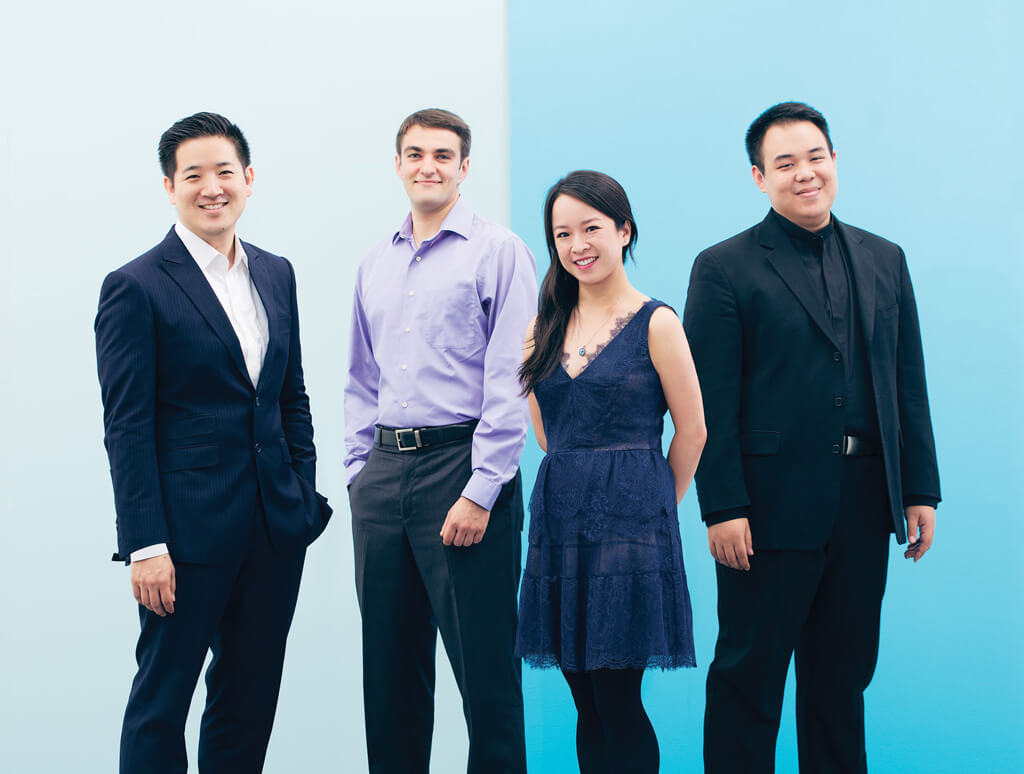
Announced during a concert at Walter Hall on Sunday night, The Afiara Quartet stated that the Sunday performance was to be their last in Toronto for the foreseeable future.
In a follow-up interview, cellist and quartet co-founder Adrian Fung confirmed that this was not so much of a retirement, as it is a convergence of new directions for the ensemble’s individual members.
“We weren’t trying to pull a fast one or anything like that,” Fung said. “For about a year now the quartet has been talking about the next steps in our future. Of course, the public deserved to know if we’re disbanding or not.”
The quartet confirmed that they will honour all upcoming engagements at Music in Port Milford, the Ottawa Chamber Music Festival, as well as at Banff International String Quartet Competition (BISQC) where they will mark their final performance of the summer in late August.
“Banff will be our final concert, but we will play again. We still have management, and Spin Cycle still has a lot of traction with people, but essentially the model of the Afiara Quartet is going to be different,” Fung said.
The quartet’s Spin Cycle Project raised the profile of the ensemble considerably and included a double CD and concert programme with DJ Skratch Bastid and four Toronto-based composers: Kevin Lau, Laura Silberberg, Rob Teehan, and Dinuk Wijeratne.
The new direction for the ensemble includes new positions for the quartet’s inner members, violinist Timothy Kantor and violist Eric Wong. Kantor will be moving to the U.S. to accept a full-time position as Assistant Professor at the University of Arizona. Eric Wong will be joining another quartet (announcement pending).
“When we were going into a part-time model, and when members get snatched up, it puts things in a state of flux,” Fung said. “We see this as a great opportunity for our members, and it’s not to say that the Afiara won’t get back together to play more concerts — it’s something we are trying to keep open which is why saying to people that we are breaking up is not necessarily the case.”
Fung stated that switching to a part-time basis was a response to the marketplace in general. Many of the world’s greatest string quartets are part-time ensembles with members working day jobs in academia and elsewhere. Fung said that at about 75-80 concerts per year, the quartet feels it is “moving in that direction.”
Fung also mentioned that the ensemble’s performance fee was an issue for them. “We realised that if we take certain concerts and projects, it actually killed the market for younger quartets. As a 10-year-old ensemble we’re nearing a mid-level career stage, but if we take a concert for lower than our fee, emerging groups are then expected to play for even less. We realised there was a certain pattern here.”
The idea is to encourage presenters to look at younger groups and pay higher rates. For Afiara, that model was based on demand.
“A lot of emerging groups have very low fees,” Fung said but cited that the market is moving towards paying much lower fees for chamber music Fung mentioned that even arts presenters struggle with the high fees that groups like the Emerson Quartet charge. “If a nine-time Grammy award-winning ensemble can’t charge its fee, you can’t expect anyone else to charge more than that,” Fung said.
“Some see that the marketplace is too crowded, there are too many quartets, and some colleagues are getting very catty about things.”
The question for quartets is to continue with a more preservationist mindset or start looking for new ways for the 21st-century quartet to function.
“Is it that we are going to be playing full-time? No,” Fung said. “That’s not wrong, but for us, I want to innovate what the structure of a quartet is.”
The standard model for many string quartets is to play up to a certain point when the profile gets high, and land a residency, then start teaching. Fung said that the quartet would rather teach by doing. “Let’s not formalise something that we’ve inherited,” he said.
“It’s a good thing for Eric, Tim, Val and I, and we’ll probably meet again, but we are looking at the entire circuit a little differently.”
#LUDWIGVAN
Want more updates on Toronto-centric classical music news and review before anyone else finds out? Get our exclusive newsletter here and follow us on Facebook for all the latest.
- THE SCOOP | Royal Conservatory’s Dr. Peter Simon Awarded The Order Of Ontario - January 2, 2024
- THE SCOOP | Order of Canada Appointees Announced, Including Big Names From The Arts - December 29, 2023
- Ludwig Van Is Being Acquired By ZoomerMedia - June 12, 2023



